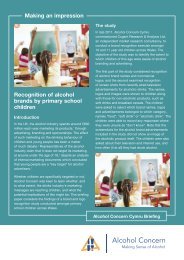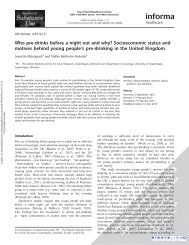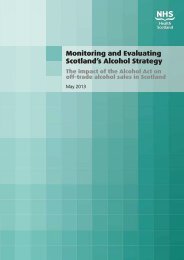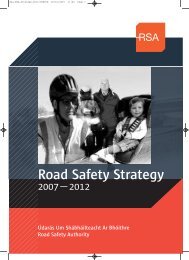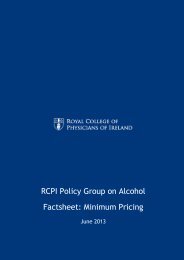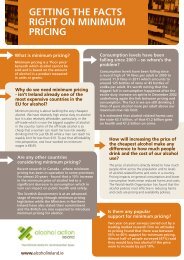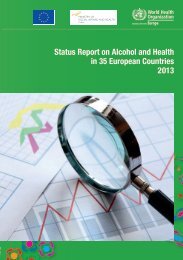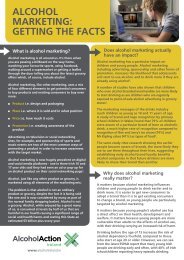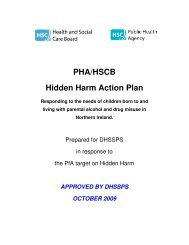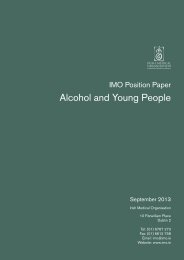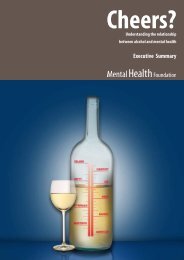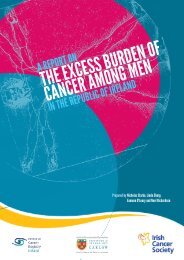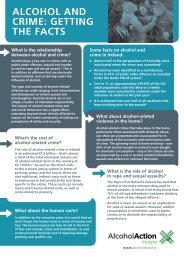Addressing the harmful use of alcohol - WHO Western Pacific Region
Addressing the harmful use of alcohol - WHO Western Pacific Region
Addressing the harmful use of alcohol - WHO Western Pacific Region
You also want an ePaper? Increase the reach of your titles
YUMPU automatically turns print PDFs into web optimized ePapers that Google loves.
<strong>Addressing</strong> <strong>the</strong> <strong>harmful</strong> <strong>use</strong> <strong>of</strong> <strong>alcohol</strong> : A guide to developing effective <strong>alcohol</strong> legislation<br />
licence. Some jurisdictions also licence wholesale distributors, which may include a right for<br />
small wine or beer producers to provide samples or sell to <strong>the</strong> public.<br />
There is evidence from a range <strong>of</strong> industries that a licensing system can be an effective<br />
means <strong>of</strong> regulating business activities in <strong>the</strong> public interest, provided it is well monitored and<br />
enforced. Legislation on <strong>the</strong> sale <strong>of</strong> <strong>alcohol</strong> could simply dictate <strong>the</strong> law and establish a set <strong>of</strong><br />
<strong>of</strong>fences to be enforced by police. A licensing system allows greater responsiveness on <strong>the</strong><br />
detail <strong>of</strong> regulating business activities and also more responsive enforcement. Responsive<br />
regulation through a licensing system can increase compliance with <strong>the</strong> law (Ayres and<br />
Braithwaite 1992).<br />
Legislation regulating <strong>the</strong> sale <strong>of</strong> <strong>alcohol</strong> typically establishes a licensing authority and<br />
processes, sets criteria and conditions for different outlets, and lists prosecutable <strong>of</strong>fences<br />
and o<strong>the</strong>r grounds for <strong>the</strong> suspension or cancellation <strong>of</strong> <strong>the</strong> licence. Offences include selling<br />
<strong>alcohol</strong> without a licence, selling <strong>alcohol</strong> outside permitted hours <strong>of</strong> trading, and selling to<br />
minors or to already intoxicated customers. The same legislation makes it an <strong>of</strong>fence for<br />
minors to purchase <strong>alcohol</strong> or for o<strong>the</strong>r adults to supply <strong>alcohol</strong> to <strong>the</strong>m (see section 6). The<br />
act will also regulate hours and days <strong>of</strong> trading, ei<strong>the</strong>r by law for all licensed premises or as<br />
a condition <strong>of</strong> each licence. Recent acts have included prohibited irresponsible promotions<br />
by licensees and this may also be <strong>the</strong> best place for o<strong>the</strong>r regulation <strong>of</strong> <strong>alcohol</strong> advertising<br />
marketing.<br />
Licensing is a mechanism for policy implementation for <strong>the</strong> purpose <strong>of</strong> meeting public<br />
health objectives and for encouraging and ensuring <strong>the</strong> responsible sale <strong>of</strong> <strong>alcohol</strong>. Licence<br />
application processes enable licensees to be vetted and educated about <strong>the</strong> <strong>alcohol</strong> laws.<br />
The privilege <strong>of</strong> a licence enables legislation to go beyond prohibiting specific <strong>of</strong>fences to<br />
requiring good management practices, such as training, age verification, providing food and<br />
non-<strong>alcohol</strong>ic drinks, noise reduction, etc. Licensing provides regulators with both a carrot<br />
and a stick (Ayres and Braithwaite 1992). Suspension or cancellation <strong>of</strong> a business’s liquor<br />
licence has a far larger financial impact than prosecution and a fine for serving a minor.<br />
Licensing can also be <strong>use</strong>d to provide flexibility, particularly at <strong>the</strong> local level, to impose<br />
conditions on <strong>alcohol</strong> sales activities as a means to address local concerns. For example,<br />
a license may be granted on condition that noise abatement modifications are made in <strong>the</strong><br />
design or with early closing hours beca<strong>use</strong> <strong>of</strong> <strong>the</strong> particular location involved.<br />
38 Return to TOC



